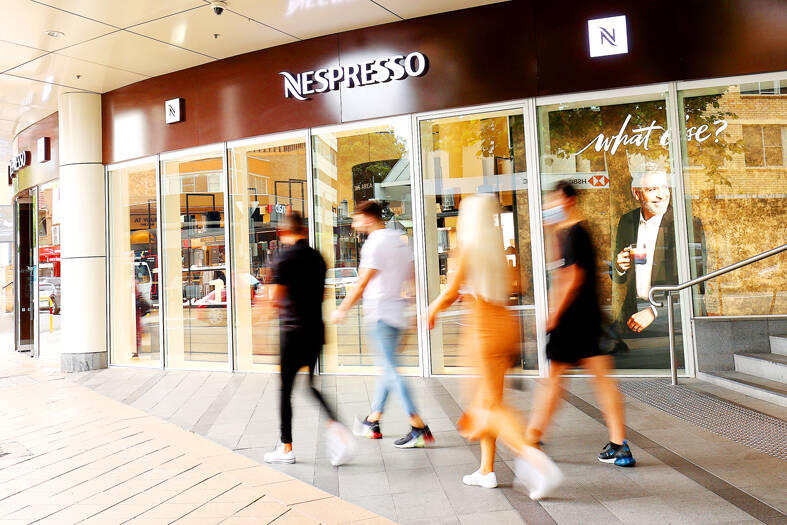Nestle SA’s Nespresso coffee business is launching paper-based compostable capsules to attract customers put off by the Swiss packaged food giant’s metal ones, which, despite being recyclable, often end up in landfill.
Nespresso CEO Guillaume Le Cunff said that not all customers were aware that its aluminum capsules are recyclable, and might be more comfortable with the compressed paper pulp pods.
“The objective is not to replace all the aluminum pods with paper, but to give the consumer more choice. It’s an alternative for sustainable options,” Le Cunff said in an interview.

Photo: Bloomberg
“You can compost the paper capsules or recycle the aluminum ones. We let the customer choose,” he added.
Nespresso is one of Nestle’s biggest brands, with sales last year of 6.4 billion Swiss francs (US$6.7 billion), and also one of its most profitable.
After surging sales during the COVID-19 pandemic, Nespresso has seen growth slowing, although Le Cunff said the launch was not a response to what he called a “readjustment.”
Le Cunff did not give any sales targets for the new capsules, which took three years to develop and are to be trialed in Switzerland and France, but hoped they would attract new consumers and keep existing ones.
Nor was the launch “greenwashing,” Le Cunff said as Nespresso had long been committed to recycling. Instead the new capsules are part of the brand’s evolution and innovation.
“People who have never considered Nespresso before will buy this capsule, and we may re onboard people who have left,” he said.
The brand had also been resilient during previous economic crises, so Le Cunff was confident about its future.
“Nespresso is an affordable luxury you might want to protect as a consumer during a tough time,” he added.

Application-specific integrated circuit designer Faraday Technology Corp (智原) yesterday said that although revenue this quarter would decline 30 percent from last quarter, it retained its full-year forecast of revenue growth of 100 percent. The company attributed the quarterly drop to a slowdown in customers’ production of chips using Faraday’s advanced packaging technology. The company is still confident about its revenue growth this year, given its strong “design-win” — or the projects it won to help customers design their chips, Faraday president Steve Wang (王國雍) told an online earnings conference. “The design-win this year is better than we expected. We believe we will win

Intel Corp chief executive officer Lip-Bu Tan (陳立武) is expected to meet with Taiwanese suppliers next month in conjunction with the opening of the Computex Taipei trade show, supply chain sources said on Monday. The visit, the first for Tan to Taiwan since assuming his new post last month, would be aimed at enhancing Intel’s ties with suppliers in Taiwan as he attempts to help turn around the struggling US chipmaker, the sources said. Tan is to hold a banquet to celebrate Intel’s 40-year presence in Taiwan before Computex opens on May 20 and invite dozens of Taiwanese suppliers to exchange views

Chizuko Kimura has become the first female sushi chef in the world to win a Michelin star, fulfilling a promise she made to her dying husband to continue his legacy. The 54-year-old Japanese chef regained the Michelin star her late husband, Shunei Kimura, won three years ago for their Sushi Shunei restaurant in Paris. For Shunei Kimura, the star was a dream come true. However, the joy was short-lived. He died from cancer just three months later in June 2022. He was 65. The following year, the restaurant in the heart of Montmartre lost its star rating. Chizuko Kimura insisted that the new star is still down

While China’s leaders use their economic and political might to fight US President Donald Trump’s trade war “to the end,” its army of social media soldiers are embarking on a more humorous campaign online. Trump’s tariff blitz has seen Washington and Beijing impose eye-watering duties on imports from the other, fanning a standoff between the economic superpowers that has sparked global recession fears and sent markets into a tailspin. Trump says his policy is a response to years of being “ripped off” by other countries and aims to bring manufacturing to the US, forcing companies to employ US workers. However, China’s online warriors